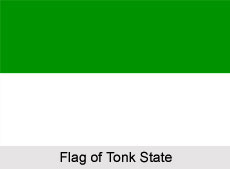 The Princely State of Tonk accepted the British suzerainty in the year 1817. After the country achieved independence and after the Partition of India in the year 1947, Tonk state acceded to the newly formed Union of India. Currently, the princely state is located in the region of the present Tonk District in the western Indian state of Rajasthan, which is bordered by Jaipur district on the north, by Sawai Madhopur district on the east, by Kota district on the southeast, by Bundi district on the south, by Bhilwara district on the southwest and by Ajmer district on the west. The Princely State of Tonk was founded by Muhammad Amir Khan, who was a military leader of Afghan descent. The received the state of Tonk in the year 1817 after he ceded to the British East India Company. He was also given the title of Nawab. Tonk state retained internal autonomy and was not under the direct control of the British Empire in India.
The Princely State of Tonk accepted the British suzerainty in the year 1817. After the country achieved independence and after the Partition of India in the year 1947, Tonk state acceded to the newly formed Union of India. Currently, the princely state is located in the region of the present Tonk District in the western Indian state of Rajasthan, which is bordered by Jaipur district on the north, by Sawai Madhopur district on the east, by Kota district on the southeast, by Bundi district on the south, by Bhilwara district on the southwest and by Ajmer district on the west. The Princely State of Tonk was founded by Muhammad Amir Khan, who was a military leader of Afghan descent. The received the state of Tonk in the year 1817 after he ceded to the British East India Company. He was also given the title of Nawab. Tonk state retained internal autonomy and was not under the direct control of the British Empire in India.
The princely state of Tonk came under the administration of the Rajputana Agency. It comprised of 6 secluded districts, of which 3 districts were under the Rajputana Agency, Nimbahera, Aligarh (Rampura) and Tonk. The rest of the three districts, namely Sironj, Pirawa and Chhabra were under the Central India Agency. Tonk state was spread over a total area of 2553 square miles. In the year 1901, the total population of the territory was 273,201 and the population of the capital of the state, the town of Tonk, was 38,759 in the same year. The town was bounded by a wall and contained a mud fort. The area also consisted of a high school, hospital for women and a separate hospital for men. The princely state did not pay any revenue to the British government of India. The major products and exports of the state included cotton, opium, grains and hides. Two of the outlying tracts of the state were served by two different railways.
During the period of 1899- 1900, the princely state of Tonk severely suffered from drought. Nawab Sir Muhammad Ibrahim Ali Khan GCIE, who reigned over the region from 1867 to 1930, attended the Durbar of Lord Lytton in 1877, as well as the Delhi Durbar in the year 1903.
After the Partition of India in the year 1947, where both the countries of India and Pakistan achieved independence and became self-governing units, the then ruler or Nawab of Tonk decided to accede the princely state to the newly formed Union of India. Later, much of the area of Tonk state was incorporated into the state of Rajasthan and other parts of the eastern territory became fraction of Madhya Pradesh state. The foundation of the principality of Tonk led to the formation of a large Rajasthani Pathan community.
The chronology of the Salarzai rulers of the princely state of Tonk are discussed as follows -
* Muhammad Amir Khan (1798- 1834)
* Muhammad Wazir Khan (1834- 1864)
* Muhammad Ali Khan (1864- 1867)
* Muhammad Ibrahim Ali Khan (1867- 1930)
* Muhammad Saadat Ali Khan (1930- 1947)
* Muhammad Faruq Ali Khan (1947- 1948)
* Muhammad Ismail Ali Khan (1948- 1974)



















